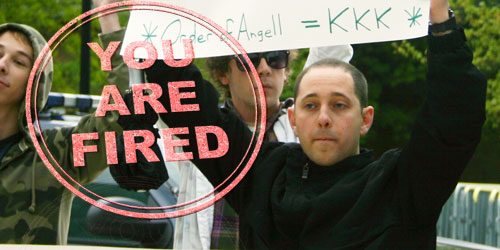
While lesbian, gay, bisexual and transgender people saw gains at the federal level in 2010, Michigan saw the ugly side of anti-gay animus with straight pride celebrations in local schools, a rash of national and local teen suicides and the death of LGBT-specific legislation in the Republican-controlled state Senate.
Bullying deaths draw local action
Nationally-covered teen suicides, many of them related to anti-gay harassment, prompted public mourning and increased calls for anti-bullying legislation.
At Michigan State University, hundreds gathered in early October for a candlelight vigil to remember those who had been lost to suicide and to send the message that students were not alone on the campus.
At Oakland University, students gathered for a more somber remembrance as they recalled their friend Corey Jackson, 19. JacksonÕs body was found in a wooded area on campus where he had apparently hanged himself.
The suicides, however, did nothing to push the stateÕs anti-bullying legislation through the state Senate, where Republicans declared it dead on Nov. 2 following a landslide night for Republican candidates in the state. Prior to that, State Sen. Wayne Kuipers, R-Holland, was chastised by Gov. Granholm for claiming the bill was stalled over the definition of bullying.
But activists saw a glimmer of light for anti-bullying legislation in the next legislative session when Gov.-elect Rick SnyderÕs pick to head the Michigan State Police said she would be a Òstrong supporter of addressing bullying in our state.Ó
Straight Pride celebrations, products appear in the state
Michigan Messenger also reported this year on the appearance of a small straight pride movement rearing its head in Michigan. The first report came during a Tea Party Express rally in Lansing. There, a t-shirt proclaiming Òstraight prideÓ was offered for sale.
In another move, students from three rural mid-Michigan school districts created a Facebook Òstraight prideÓ day and event. The movement was soundly condemned by school officials as well as national and local LGBT leaders. The event went on at the schools without incident.
LGBT state politics
During this past yearÕs election, the LGBT community saw itself not only represented by out politicians, but also targeted by politicians and activist groups.
In the August primary, Democrat Dale Kildee, D-Flint, saw a challenge from openly gay resident Scott Withers. Withers lost his bid to unseat Kildee, who went on to win the November election.
But generally, when LGBT issues came up in the past year in politics, it was negative. The negativity began with Rep. Paul Scott, R-Grand Blanc, targeting transgender people in his announcement that he would seek the Republican nomination for Secretary of State. Paul continued to support his anti-transgender crusade throughout his race.
He was beaten by Oakland County Clerk Ruth Johnson. Johnson was criticized by the LGBT community when she made an about-face on community issues.
The campaign season also saw controversy from the Campaign for Michigan Families, a conservative group headed by American Family Association of Michigan President Gary Glenn. Earlier in the year, Glenn was chastised by an Allegan County newspaper for Òcreating a climate of homophobic hysteriaÓ in the county with his groupÕs attacks on Allegan County District Judge William A. Baillargeon. Baillargeon had been involved with the Triangle Foundation and Affirmations, two LGBT organizations in the Detroit area.
The Allegan chastisement, however, did not stop Glenn or the Campaign for Michigan Families. At the end of October, the group launched an attack ad targeting openly lesbian candidate for state representative Toni Sessoms. This lead to a powerful, ironic and funny YouTube video from Sessoms countering the allegations in the ad. Sessoms lost her bid.
But no issue garnered more attention than a battle between the openly gay and elected student leader of the University of Michigan Chris Armstrong and conservative Assistant Attorney General Andrew Shirvell. Shirvell ran a blog attacking Armstrong and had shown up at his off-campus house. ShirvellÕs behavior made national headlines when Anderson Cooper featured his story on CNN.
Armstrong sought a personal protection order against Shirvell, though he ultimately dropped the bid, and U-M barred Shirvell from the campus. That ban was later changed to allow him to be on campus but not have contact with Armstrong. While Attorney General Mike Cox, a Republican, started by defending Shirvell, he ultimately brought administrative charges against him. The hearing lead to ShirvellÕs dismissal from the AGÕs office for using state equipment to blog about Armstrong and lying to state investigators.
State and local officials struggle to move LGBT equality issues
Finally, the state saw a series of state and local policy moves to push a pro-LGBT equality movement forward.
On a state level, the Michigan Department of Corrections booted an anti-gay ministry — Corduroy Ministries — out of its ministry programs after the Lansing group lost its national affiliation with the ex-gay group Exodus International.
In addition to the MDOC move, the State Civil Service Commission took up and then tabled a proposal to extend health care benefits to Other Eligible Individuals. OEI is a policy program created by Michigan State University and cloned at other locations to address a 2008 state Supreme Court ruling that found same-sex partner benefit programs violated a constitutional amendment passed by voters in 2004 which made marriage a union between one man and one woman.
In East Lansing, the week after the SCSC tabled its OEI proposal until the new year, the East Lansing City Council directed staff to prepare to implement such a program in July for city employees.
In Holland, officials were asked to consider an ordinance protecting LGBT people from discrimination in the conservative community. The community had come under fire after Hope College, located in the city, refused to allow Oscar-winning writer Dustin Lance Black to appear on campus. Two groups were formed out of that movement. The Holland Council sent the proposal to its Human Relations Commission, which sent it back to the body in November.
Originally published in Michigan Messenger.










